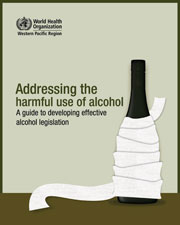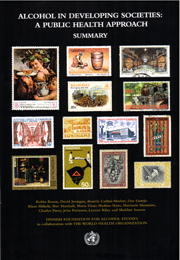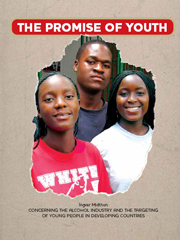
New legislation in Sri Lanka
- The new Parliament Act on alcohol and tobacco control is a major breakthrough for public health promotion in Sri Lanka. And just as important, we have experienced how youth of a country can be a powerful force that can be effectively mobilized to take care of public health policies, says Pubudu Sumanasekara, the director of ADIC, the Alcohol and Drug Information Centre in Colombo.
This summer the Parliament of Sri Lanka, on a proposal by the Government, passed a new law with the purpose of eliminating tobacco and alcohol related harm and, by that, to protect the public health. The law is named “National Authority on Tobacco and Alcohol” and includes both a government body to follow up the alcohol and tobacco policies in Sri Lanka and a set of policy measures that will come into operation within short. – Our next challenge is the implementation of the new Act, says ADIC Director Mr. Sumanasekara. – It is our responsibility to keep an eye on the implementation, as we should expect violation of the act by the tobacco or alcohol industry or they might again go to court.
Sri Lanka is one of the many developing countries where the alcohol industry pushes hard to promote new drinking habits and increased consumption. Says Mr. Sumanasekara: - The new Act on alcohol and tobacco control will put an end to advertisements for such products. The Act also has the ambitious goal to stop all other types of promotion and marketing activities for alcohol and tobacco, like sponsorships for any educational, cultural, social or sporting organization, activity or event. The free distribution of alcohol products will also be prohibited, and the same is the case for sale through vending machines or other types of self-service systems.
Another ambition of the Act is to curtail the access to tobacco products and alcohol products, especially for children and youth. Followingly, the legal purchasing age for alcohol will be raised to 21 years, and the seller will be liable.
- It has been a long process, comments Ms Pamodinee Wijayanayake of FORUT Sri Lanka. She was the Director of ADIC until recently and has followed the process leading up to the decision of the Sri Lankan parliament. – It started out with a Presidential Task Force in the mid-90s, which drafted a new Act, and this Act was adopted by the Cabinet in 1999. The draft Act then entered into the Parliaments Order Paper in 1999.
Nothing happened to the proposed bill before it re-emerged as a Private Members Bill. Then it was challenged at the Supreme Court of Sri Lanka in 2005/2006, but the Court ruled the bill not to be in conflict with the constitution of the country.
- An important step was taken by the government when the Bill was adopted by the Hon. Minister of Health and presented to the Parliament is his name, says Ms. Wijayanayake. She explains that ADIC and its partners in the NGO and scientific communities, and in particular the youth organizations 4U, have played an important part in the process leading up to the new policy in Sri Lanka. – It has been essential to show that alcohol and tobacco prevention is both an important professional issue and a peoples’ issue. Therefore we have been working on several areas. ADIC and our partners in the scientific community have acted as professional agencies, providing information and documentation, also from other countries and regions. We have also presented alternative policy options, based on experiences from other countries, as well as drafted texts for politicians and the government administration.
- On the other hand we have mobilized many groups in the civil society in support of the new policy. We convened the first NGO Policy Forum to discuss alcohol and tobacco prevention, and after that several organizations have made the new alcohol policy a part of their priorities. Another example is the new youth movement 4U, which has been instrumental in mobilizing young people of Sri Lanka. They set out to collect one million signatures in support of the bill, but suddenly the parliament process speeded up and the bill was adopted when 4U had collected “only” 50.000 signatures! Now the 4U movement will mobilize in support of a rapid and proper implementation of the bill, says Ms. Pamodinee Wijayanayake of FORUT Sri Lanka.
![]()
![]()
Developed with CustomPublish CMS by Nettinfo AS




